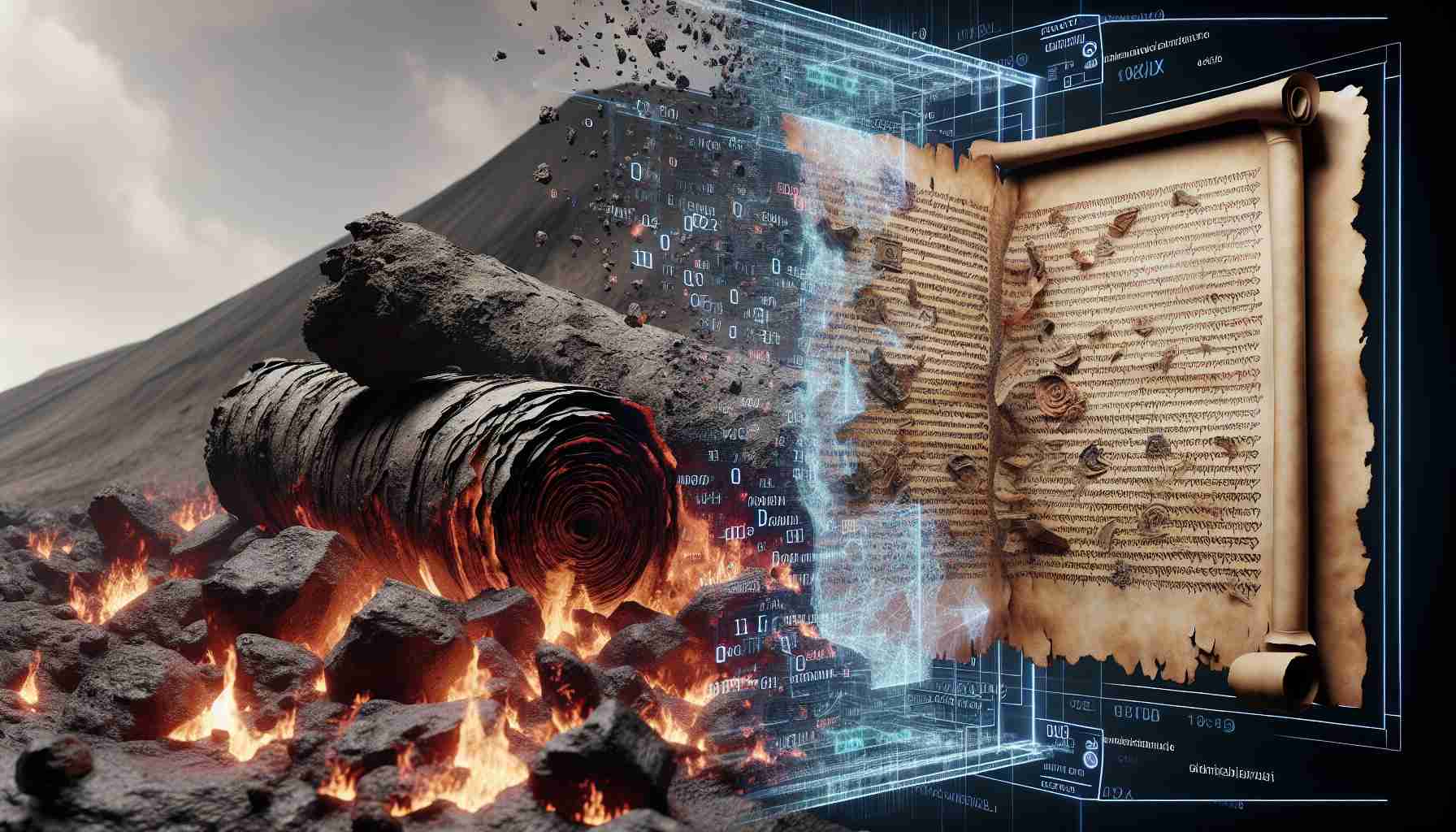In 79 AD, the devastating eruption of Mount Vesuvius resulted in the destruction of the resort towns of Pompeii and Herculaneum, leaving a trail of human tragedy in its wake. However, buried within the volcanic ash were not only the remains of countless lives, but also a treasure trove of ancient scrolls. The charred and unreadable scrolls from the library in Herculaneum remained a mystery for centuries, until the advent of AI and X-ray technology made decipherment possible.
Gone are the days when attempting to decode these fragile scrolls would lead to their destruction. Recent advancements in AI and imaging algorithms have revolutionized the field of archaeology, enabling scholars to gain valuable insights into the past. One remarkable example is the En-Gedi scroll, which was successfully deciphered using scans and image-processing algorithms. This ancient manuscript turned out to be fragments of the Book of Leviticus, making it the earliest discovery of its kind.
Inspired by such achievements, a group of technology enthusiasts initiated the Vesuvius Challenge. With a prize fund of over $1 million, the challenge aimed to decode 5% of one of the papyri scrolls from the Herculaneum library. The winners, Luke Farritor, Youssef Nader, and Julian Schilliger, trained machine-learning algorithms to decipher around 2,000 characters from the end of a previously unknown Greek text.
While the full meaning of the deciphered text is still being explored by scholars, preliminary readings suggest it may contain the musings on pleasure by Epicurean scholar Philodemus, who is believed to have been associated with the scrolls’ discovery. The text touches upon the value of abundance versus scarcity, highlighting that scarcity does not necessarily equate to greater pleasure.
This breakthrough is just the tip of the iceberg, as there are countless more charred scrolls waiting to be decoded. Consequently, the Vesuvius Challenge is far from over, with a new phase offering a $100,000 prize for the team that can retrieve 90% of the currently scanned scrolls.
The integration of AI into classical scholarship has opened up exciting new opportunities for researchers, despite initial expectations. It is now clear that a strong foundation in traditional disciplines like Latin, Greek, and Hebrew, along with computer science, will be essential for those aspiring to explore these unique intersections.
As more scrolls are deciphered using AI, the field of archaeology will witness an exponential growth in research possibilities, shedding new light on ancient civilizations and ultimately challenging established knowledge. The power of AI continues to reshape our understanding of the past, proving that innovation and tradition can coexist harmoniously in the realm of knowledge.
FAQ Section:
1. What was the Vesuvius Challenge?
The Vesuvius Challenge was a competition initiated by a group of technology enthusiasts to decode a papyri scroll from the Herculaneum library using machine-learning algorithms.
2. What was the prize fund for the Vesuvius Challenge?
The prize fund for the Vesuvius Challenge was over $1 million.
3. Who were the winners of the Vesuvius Challenge?
The winners of the Vesuvius Challenge were Luke Farritor, Youssef Nader, and Julian Schilliger.
4. What did the winners decipher?
The winners deciphered around 2,000 characters from the end of a previously unknown Greek text.
5. What is the significance of the En-Gedi scroll?
The En-Gedi scroll, successfully deciphered using AI and image-processing algorithms, turned out to be fragments of the Book of Leviticus, making it the earliest discovery of its kind.
6. What is the content of the deciphered text in the Vesuvius Challenge?
The full meaning of the deciphered text is still being explored, but preliminary readings suggest it may contain the musings on pleasure by Epicurean scholar Philodemus, who is believed to have been associated with the scrolls’ discovery.
7. What does the deciphered text suggest about pleasure?
The deciphered text suggests that scarcity does not necessarily equate to greater pleasure, highlighting the value of abundance versus scarcity.
Key Terms/Jargon:
1. AI: Artificial Intelligence, a branch of computer science that deals with the development of intelligent machines that can perform tasks that would typically require human intelligence.
2. Decipher: To convert a coded or encrypted text into a language that can be understood.
3. Papyri: Plural form of papyrus, a material used in ancient times for writing.
4. Scroll: A roll or sheet of parchment, papyrus, or paper containing writing or images.
5. Epicurean: Related to Epicureanism, a philosophical system founded by Epicurus that emphasizes pleasure as the highest good and seeks to attain a state of tranquility and freedom from fear.
Suggested Related Links:
1. Archaeology.org
2. ScienceDaily – Archaeology News
3. National Geographic – Ancient Civilizations
The source of the article is from the blog shakirabrasil.info

